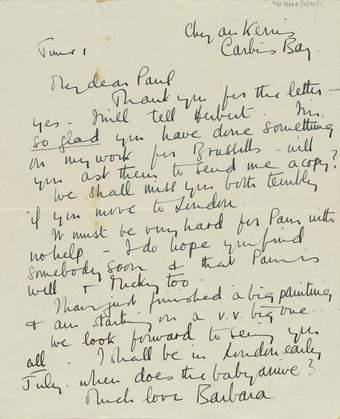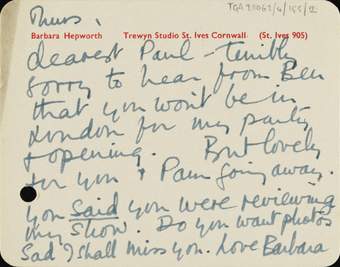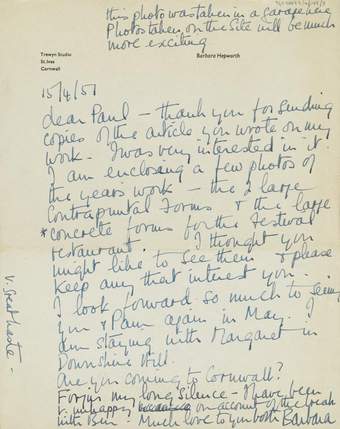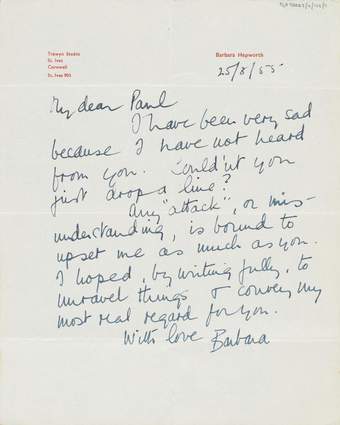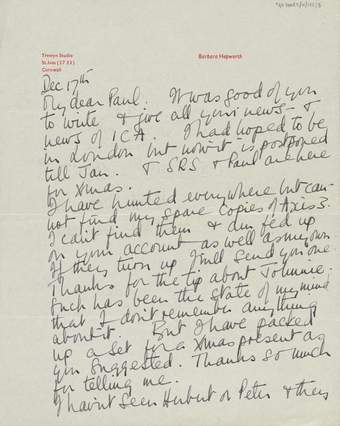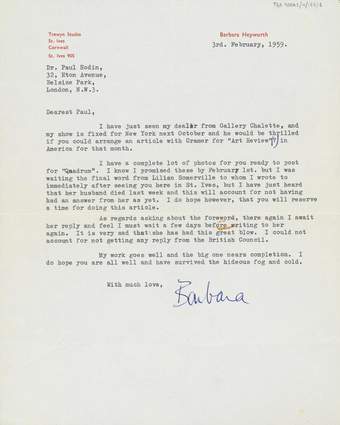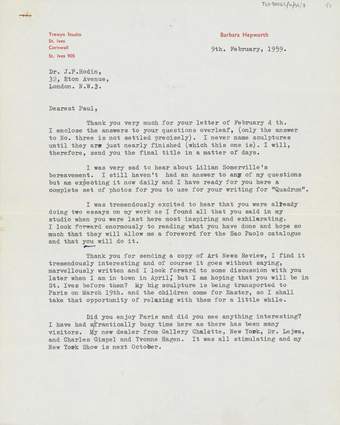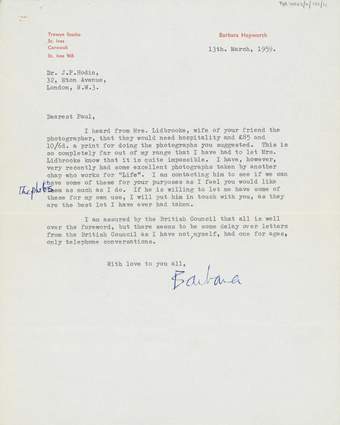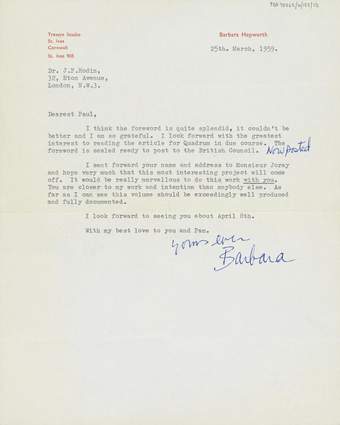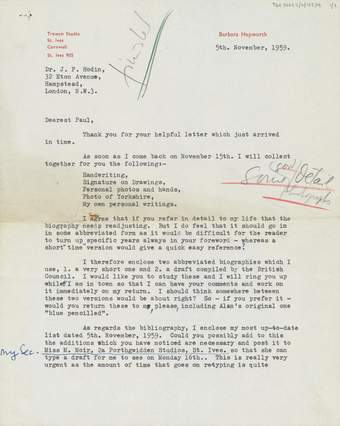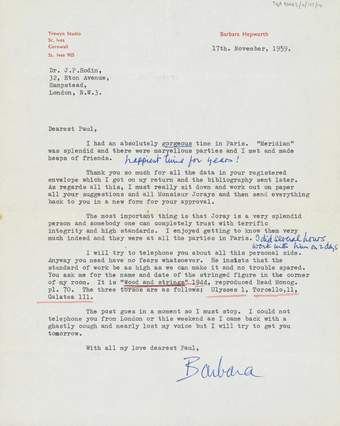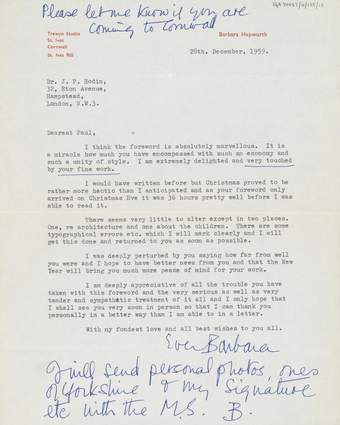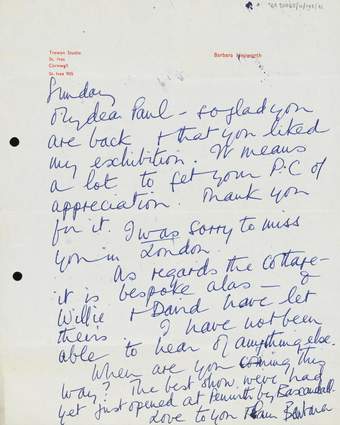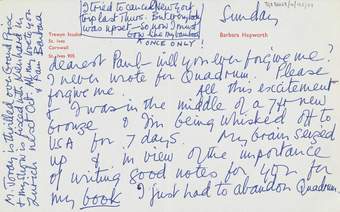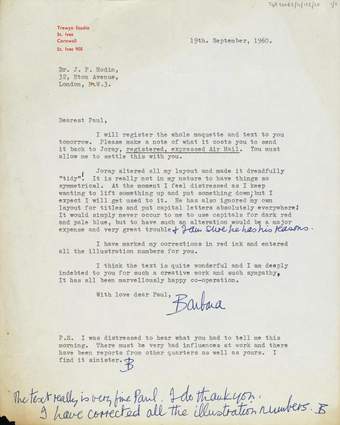Papers of Josef Paul Hodin
1885–2000s

Josef Paul Hodin (1905-95) was an art critic and novelist. Born in Prague in 1905, he read Law at Charles University before leaving Czechoslovakia to pursue a literary career in Germany. Moving in artistic circles he met and befriended artists and spend time at their studios. The declining political situation in Europe presented an increasingly dangerous situation for Hodin and he was forced to leave Germany for Paris, and thence to his first wife Birgit Akesson's native Sweden in 1935. In Sweden Hodin became a respected art critic and regularly contributed articles to art reviews such as 'Konstrevy' and 'Ord och Bild', and published his first monographs on Swedish artists Ernst Josephson and Sven Erixson. By 1944, his marriage to Akesson had failed, and he came to England where he worked first as personal assistant to Jan Masaryk, the Czech Minister of Foreign Affairs, and later as press attaché to the Norwegian government in exile. In 1945 he married his second wife, Pamela Simms and from 1949-54 was director of studies and librarian of the Institute of Contemporary Arts. From this period onwards, Hodin's output of articles, lectures and books was prodigious. There were seminal books on aesthetics, including 'The Dilemma of Being Modern' (1956) and 'Modern Art and the Modern Mind' (1972), as well as important interpretations of Expressionism and German art from Munch to Schwitters; best seen in the biography of Oskar Kokoschka (1966), who was a close family friend. Hodin also championed emigre artists that had fled the Nazi regime as well as key European masters such as Emilio Greco and Giacomo Manzu. With a second home in Cornwall Hodin also took a special interest in what was happening in St Ives leading to some of the best books on Henry Moore (1956), Lynn Chadwick (1961), and Barbara Hepworth (1961).
This material has been selected to offer a broad picture of Hodin's prolific output and his unique approach to art criticism, an approach which depended on knowing his subjects personally and utilised all the resources of his cultural background. By these means Hodin endeavoured to look beyond the simple aesthetic judgment of art to investigate the spirit which created it.
This archive was catalogued and digitised as part of the Émigré Art Archives Project, generously funded by the Marie-Louise von Motesiczky Charitable Trust. All translations courtesy of Jonathan Blower.
- Collection Owner
- Dr J. P. Hodin
- Collection
- Tate Archive
- Acquisition
- Accepted by HM Government in lieu of inheritance tax and allocated to Tate, 2006. Accrual presented by Annabel Hodin, 2020.
- Reference
- TGA 20062
407 objects in this collection
- Title
- Papers of Josef Paul Hodin
- Date
- 1885–2000s
- Description
- Josef Paul Hodin (1905-95) was an art critic and novelist. Born in Prague in 1905, he read Law at Charles University before leaving Czechoslovakia to pursue a literary career in Germany. Moving in artistic circles he met and befriended artists and spend time at their studios. The declining political situation in Europe presented an increasingly dangerous situation for Hodin and he was forced to leave Germany for Paris, and thence to his first wife Birgit Akesson's native Sweden in 1935. In Sweden Hodin became a respected art critic and regularly contributed articles to art reviews such as 'Konstrevy' and 'Ord och Bild', and published his first monographs on Swedish artists Ernst Josephson and Sven Erixson. By 1944, his marriage to Akesson had failed, and he came to England where he worked first as personal assistant to Jan Masaryk, the Czech Minister of Foreign Affairs, and later as press attaché to the Norwegian government in exile. In 1945 he married his second wife, Pamela Simms and from 1949-54 was director of studies and librarian of the Institute of Contemporary Arts. From this period onwards, Hodin's output of articles, lectures and books was prodigious. There were seminal books on aesthetics, including 'The Dilemma of Being Modern' (1956) and 'Modern Art and the Modern Mind' (1972), as well as important interpretations of Expressionism and German art from Munch to Schwitters; best seen in the biography of Oskar Kokoschka (1966), who was a close family friend. Hodin also championed emigre artists that had fled the Nazi regime as well as key European masters such as Emilio Greco and Giacomo Manzu. With a second home in Cornwall Hodin also took a special interest in what was happening in St Ives leading to some of the best books on Henry Moore (1956), Lynn Chadwick (1961), and Barbara Hepworth (1961).
This material has been selected to offer a broad picture of Hodin's prolific output and his unique approach to art criticism, an approach which depended on knowing his subjects personally and utilised all the resources of his cultural background. By these means Hodin endeavoured to look beyond the simple aesthetic judgment of art to investigate the spirit which created it.
This archive was catalogued and digitised as part of the Émigré Art Archives Project, generously funded by the Marie-Louise von Motesiczky Charitable Trust. All translations courtesy of Jonathan Blower. - Reference
- TGA 20062

